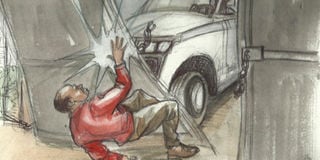Part 2: The intention to kill

One of the elements that must be proved beyond reasonable doubt in a murder trial is the intention to kill or what is legally known as malice aforethought.
Failure to prove this important element will lead to an acquittal of the accused person on murder charges, although the person may be convicted of the lesser offence of manslaughter.
The intention to kill is in reality the state of the mind of the accused at or about the time of commission of the crime. The intention to kill is construed from the circumstantial evidence and includes behaviour of the accused person or words uttered by the accused before or after the act or omission complained of, the type of weapon used the part of the body injured and the number of blows sustained, amongst other issues court may consider.
In one of the most controversial and contentious murder trials in Uganda, Mrs Jackeline Uwera was found guilty of causing the death of her husband, Juvenal Nsenga, by intentionally knocking him with a car as he came to open the gate for her.
The forensic evidence however established that Mrs Uwera knocked the gate which in turn knocked down her husband and thereafter the car then dragged him for about 10 meters on the rough driveway. Prosecution failed to prove that Mrs Uwera knew it was her husband who had come to open the gate for her. And moreover this, according to her husband, was the first time ever, for him to open the gate for her.
Mrs Uwera appealed the conviction and the Director of Public Prosecutions put up a spirited fight and one of the areas the DPP relied on was the behaviour of Mrs Uwera.
Conduct of Mrs Uwera
One of the grounds of the appeal that the lawyers acting for and on behalf Mrs Uwera raised was that the trial court did not consider the evidence that Mrs Uwera was distressed after the incidence complained of. One of the witnesses told court that Mrs Uwera was hysterically crying when she called him to inform him of the incidence and was in distress.
Mrs Uwera told the witness that “given her marital relationship, the world was going to misunderstand her and think that she had killed her husband”. To the DPP, Mrs Uwera’s distress did not arise out of the impending death of her husband but rather out of her anxiety of what the world would think of her actions.
According to the DPP the evidence of all the witnesses who went to the hospital where the victim was taken unanimously and consistently showed that Mrs Uwera was calm and normal and that she never went to the room where her husband had been admitted.
Witnesses also told court that Mrs. Uwera held on to her husband’s phone and the keys of the car that he used to keep his important documents in. She only released these items when she was virtually forced to. This, to the DPP could not be construed as the behavior of a distressed wife whose husband was fighting for his life as a result of her very actions.
To the DPP Mrs Uwera’s conduct contradicted that of a purported distressed person. She strategically picked on the elder brother of her husband who was also the best man at their wedding as the person to portray her distress.
She needed a buffer for her callous actions and found one in him. And further still, although the victim was still alive, Mrs Uwera was certain in her conversation with her brother-in-law that her husband was going to die. In spite of this state of affairs she was calmly seated at the reception with a friend while her husband was fighting for his life.
Family strife
Another ground of the appeal was that the trial court ignored the prevalent strife between Mrs Uwera and her in-laws which arose out of the estate of the deceased. To the DPP this was not a matter brought up in the main trial especially to the family members of the deceased who testified.
On the contrary it came out at the trial that the family members of the deceased forgave Mrs Uwera and never even reported this case to the police. Rather, it was the police who approached them and asked them for statements.
Shifting the burden of proof
The DPP submitted to the Appellate court that the trial court did not shift the burden of proof to Mrs Uwera when a phase in the judgment was quoted by the lawyers in the appeal “in the absence of further explanation as to how the car jerked and knocked Nsenga”.
Instead, to the DPP, lawyers acting for Mrs Uwera picked this sentence out of context and simply tried to capitalize on it; instead this was part of the analyses of the evidence relating to the mechanical condition of the car alongside other expert evidence.




